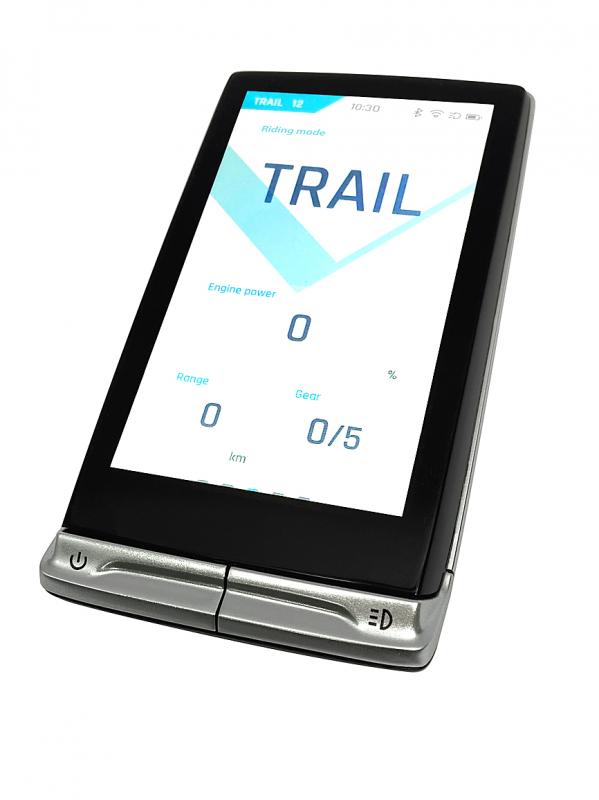FIT Hon Teng Ltd (鴻騰精密), an electronic components manufacturing arm of a subsidiary of Hon Hai Precision Industry Co (鴻海精密), yesterday launched its first displays and advanced controllers for electric bikes.
Hong Kong-listed FIT said in a statement that the new products aim to grasp new business opportunities emerging from a major shift in travel behaviors from public to private transportation in the post-COVID-19 pandemic era.
The controller, usually mounted on an electric bike’s frame, collects data from the battery, motor, throttle and pedal assist system, and sends signals to the electronic system, including the battery level, speed and level of pedal assistance on the rider’s display.

Photo courtesy of FIT Hon Teng Ltd
In Europe, older people and commuters are turning to electric bikes, especially in urban areas, as they are light and require no license or registration, FIT said.
Moreover, many governments in Europe are offering subsidies for purchases of electric bikes to encourage people to ride them to combat the spread of COVID-19, it said.
FIT has secured orders from the world’s major electric bike makers to supply connectors used in advanced e-bike models, it said.
To expand its presence in global supply chains, the company is focused on developing components used in power energy management, automotive connectivity and human interfaces, it said.
Mobile components are the biggest revenue contributor, accounting for about 27 percent of FIT’s sales in the first half of last year, when it had revenue of US$1.98 billion, while components used in autos, and industrial and medical devices made up 30 percent, company data showed.
FIT also makes electronic and optoelectronic connectors, antennas, acoustic components, cables and modules used in computers, smartphones and consumer electronics.

Taiwan Semiconductor Manufacturing Co (TSMC, 台積電) yesterday said that its investment plan in Arizona is going according to schedule, following a local media report claiming that the company is planning to break ground on its third wafer fab in the US in June. In a statement, TSMC said it does not comment on market speculation, but that its investments in Arizona are proceeding well. TSMC is investing more than US$65 billion in Arizona to build three advanced wafer fabs. The first one has started production using the 4-nanometer (nm) process, while the second one would start mass production using the

A TAIWAN DEAL: TSMC is in early talks to fully operate Intel’s US semiconductor factories in a deal first raised by Trump officials, but Intel’s interest is uncertain Broadcom Inc has had informal talks with its advisers about making a bid for Intel Corp’s chip-design and marketing business, the Wall Street Journal reported, citing people familiar with the matter. Nothing has been submitted to Intel and Broadcom could decide not to pursue a deal, according to the Journal. Bloomberg News earlier reported that Taiwan Semiconductor Manufacturing Co (TSMC, 台積電) is in early talks for a controlling stake in Intel’s factories at the request of officials at US President Donald Trump’s administration, as the president looks to boost US manufacturing and maintain the country’s leadership in critical technologies. Trump officials raised the

‘SILVER LINING’: Although the news caused TSMC to fall on the local market, an analyst said that as tariffs are not set to go into effect until April, there is still time for negotiations US President Donald Trump on Tuesday said that he would likely impose tariffs on semiconductor, automobile and pharmaceutical imports of about 25 percent, with an announcement coming as soon as April 2 in a move that would represent a dramatic widening of the US leader’s trade war. “I probably will tell you that on April 2, but it’ll be in the neighborhood of 25 percent,” Trump told reporters at his Mar-a-Lago club when asked about his plan for auto tariffs. Asked about similar levies on pharmaceutical drugs and semiconductors, the president said that “it’ll be 25 percent and higher, and it’ll

CHIP BOOM: Revenue for the semiconductor industry is set to reach US$1 trillion by 2032, opening up opportunities for the chip pacakging and testing company, it said ASE Technology Holding Co (日月光投控), the world’s largest provider of outsourced semiconductor assembly and test (OSAT) services, yesterday launched a new advanced manufacturing facility in Penang, Malaysia, aiming to meet growing demand for emerging technologies such as generative artificial intelligence (AI) applications. The US$300 million facility is a critical step in expanding ASE’s global footprint, offering an alternative for customers from the US, Europe, Japan, South Korea and China to assemble and test chips outside of Taiwan amid efforts to diversify supply chains. The plant, the company’s fifth in Malaysia, is part of a strategic expansion plan that would more than triple